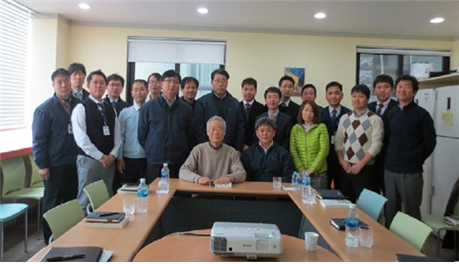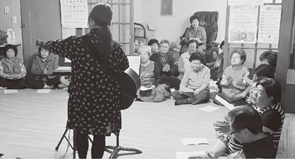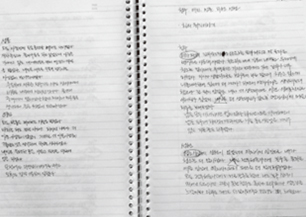Lee's Character Education HPM can be effectively performed not only at home and at school but also at work. It can be effectively carried out in various social setting, including on military base or at seniors’ centers as well. |
 |
|
Once a month, members of the department or team can adopt the Lee's Character Education HPM in their personal life or with the goal of creating a better work environment. This can be also used for new employee training or employee/management workshops. |
| |
 |
|
|
 |
|
Lee's Character Education HPM is being effectively carried out at seniors’ centers. Specific example is the Cultural Campaign for New Living at Onhye-ri, which has been sponsored by the city of Andong on a trial basis since 2014. The campaign aims to help local senior citizens stay healthy, both physically and mentally. Regular exercise is crucial for seniors. Lack of exercise in old age may cause stiff muscles, and the deterioration of internal organs. For this reason, it is very important for seniors to get together, work out for 30 minutes every day and have fun for the sake of their health. The same principle applies to mental health. If it is neglected, seniors will be controlled by unnecessary thoughts, which will lead them to feel depressed, angry or anxious. Therefore, the aim of this campaign is to help senior citizens to develop a habit of staying healthy through exercises, staying happy, forgiving others and being grateful even for the smallest things. |
| |
 |
|

|
|
The following describes the programs held at the town community center at Onhye-rion, Andong city. |
|

|
- |
Select 1 MC and a clerk from each town and train them with 5 two-hour sessions. An MC can be someone who can sing and cheerfully run the program. If he or she can play a musical instrument, that’s even better. |
|
 |
1
2
3 |
Everyone stands in rows, leaving enough room for exercise. People may be seated as well.
The MC comes out to the stage.
The MC leads the education session by following the steps below for 30 minutes every morning, based on the 1-1-6 tool, with the themes: "always stay happy" and "think of the other person’s perspective first." |
|
 |
Read a story with lessons. The MC can read it, or everyone can read it out loud together. |
 |
Memorize the story. To do this, have a couple of participants summarize the story. |
 |
Everyone can share their thoughts on the story. They can share their experiences with other people, too. |
 |
Find a lesson from the story and make a short phrase like "think of the other person’s perspective first" or "always stay happy." Participants can sing a song, replacing the lyrics with these phrases. They can also exercise to the slogan or dance to it while singing along to a song. Encourage participants to repeat these chants while walking to different places or working on something. |
 |
Share a detailed plan on how to integrate the lessons into daily life and make a pledge to practice. |

|
Share the stories of the actual practice of step 5 in the following day’s education session. |
|
| This campaign is continuing with the support of local senior citizens. In 2015, Gyeongsangbuk-do designated a "Grandma, Grandpa's Day" and entrusted Bakyak-Hue to establish a new living culture for seniors. The aim is to help senior citizens to live a healthy and happy life. |
 |
|
| |
Lee's Character Education HPM has been successfully carried out on military bases. In 2015, it successfully completed a trial of character/life education targeting officers and soldiers in a military base. This program is continuing in 2016 targeting all the officers and soldiers of 30th Division of Korea Army. |
|
 |
| |
 |
Bakyak-Hue supported and led character education for soldiers on an army base for 6 months, from January to June of 2015. 350 officers and soldiers from a battalion participated in the education. During their roll call, 3 months for each, they looked back on their behavior on these two themes: staying happy at all times and thinking of others' perspectives first. Throughout the day, the themes were continuously repeated through chants and actions. Soldiers performed activities such as the "smile exercise," "fellow compliment relay" and "5 things to be grateful for" and had worked on the life charter 1-3-10 and practiced 1-1-6 stage.
As a group activity they had discussion session |
|
| |
based on a story from <Collection of stories with lessons for Character and Life Education> provided by Bakyak-Hue.
After the session, soldiers were required to keep a journal on "a goal for tomorrow" and "things that were done today" according to the themes: "always stay happy" and "think of others' perspectives".
As the education was settling in, soldiers would encourage each other during a rough training session or tiring daily tasks, jokingly saying, "always be happy" and "walk in other’s shoes." According to the army base's own survey after the education was completed, incidents like verbal abuse, assault and internal irrationality were decreased by 30% compared to the previous year. In particular, when it came to the soldiers' use of language, negative expressions including cursing and slang were significantly reduced. The subject battalion had always wanted to find a way for soldiers to be considerate of their fellow officers, the battalion, the group and the organization first before themselves. According to the battalion's evaluation, this character/life education helped those individuals to mature and establish the values needed for service in the army. This broke the stereotype that it may not be easy to carry out character/life education on army bases. |
|
|
|







